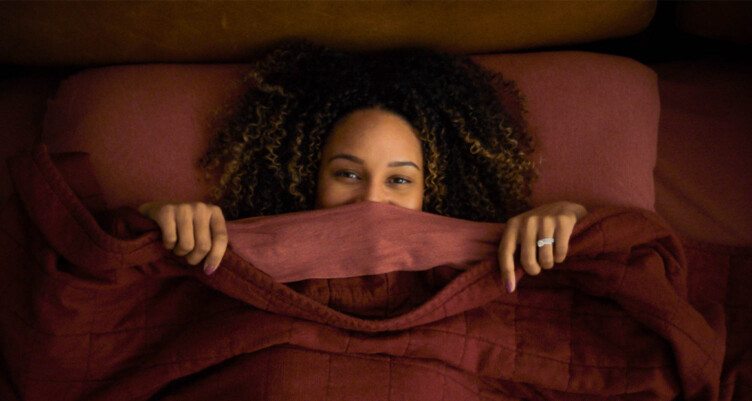Why Is Sleep Important? Benefits Of Getting Enough Rest

- There are many benefits of sleep, including muscle recovery, weight management, and immune support.
- REM, otherwise known as “rapid eye movement,” refers to the fourth stage of sleep when most dreams occur. This last stage of sleep is key in promoting healthy brain function.
- While studies point to clocking in at least 7 hours of sleep per night to avoid any “adverse health outcomes,” it is even more important to have quality sleep over quantity.
Sleep is one of the pillars of high performance.
Your whole body runs better after a good night’s sleep, and considering that struggles with occasional insomnia are common, it’s worth your time to learn how to improve your sleep so you get the most restorative rest possible.[1] The benefits of sleep include better brain function, muscle recovery, hormone balance, longevity, and fat burning.
“Sleep plays a vital role in good health and well-being throughout your life,” reads an article on the National Heart, Lung, and Blood Institute site. “During sleep, your body is working to support healthy brain function and maintain your physical health.”
Read on to learn the benefits of sleep and how deep sleep upgrades your biology.
Deep sleep improves brain function

Your brain relies on quality sleep to function properly. After mild sleep deprivation (staying up for 19 hours), your reaction time, attention, memory, and mental accuracy are negatively impacted, and your brain performs as if you had a blood alcohol concentration of 0.05 percent.[2] After an all-nighter (24 hours without sleep), you perform like you’re under the influence.[3]
A night of deep sleep, on the other hand, gives your brain a chance to clear out cellular waste and repair old or damaged brain cells.[4] You wake up with a stable mood and an increased ability to learn.
The key is entering into two different stages of sleep: stage 3 and stage 4. Stages 1-3 are considered non-rapid eye movement sleep, while the final stage — stage 4 — is when you reach rapid eye movement (REM). Stage 3, which is considered the deepest non-REM sleep stage, is vital because this is the time “the body repairs and regrows tissues, builds bone and muscle, and strengthens the immune system.” Stage 4 usually begins 90 minutes after falling asleep. The brain is highly active at this stage; not only does the brain undergo repair and restoration, but it also increases its metabolism.[5]
Low-quality sleep impairs muscle recovery and fat loss

Sleep is also associated with muscle recovery. When you don’t sleep well, your hormones are impacted: Your testosterone and growth hormone levels drop, impairing your protein synthesis, thus limiting the ability to build more muscle.[6] At the same time, your cortisol goes up, promoting fat storage and activating muscle degradation pathways that break down your hard-earned lean mass.[7][8] It’s been said that short periods of sleep deprivation (less than a week) “can compromise glucose metabolism, reduce insulin sensitivity, and impair muscle function.”[9] In short, restricting your body of sleep — even for only a few days — may lay the groundwork for future chronic health issues, including obesity and neuromuscular disease.
If you exercise regularly, aim for between seven and nine hours of high-quality sleep a night. Those who get an adequate amount of sleep may experience improved athletic performance and a reduced risk of injury and illness.[10]
Deep sleep helps you live longer and better

Plentiful sleep has a profound effect on longevity, too. A 2014 study that followed two age groups — adults aged 85-105 and adults aged 60-70 — found that the oldest individuals (the 85-105 age group) “maintained strictly regular sleep-wake schedules” when compared to the others.[11]
In general, people who get deep sleep in complete darkness may also have a lower risk of cancer than people who don’t sleep well or sleep with light exposure at night.[12] Researchers suspect this may have something to do with how consistently you produce melatonin, a sleep hormone that you don’t produce as well when you expose yourself to light at night. Light exposure, including blue light from phone screens, has a huge impact on sleep quality, which is why blacking out your room is essential.
Getting fewer than six hours of sleep a night may also increase your risk of heart attack and diabetes, and consistent sleep deprivation (either low-quality sleep or fewer than seven hours a night) may increase your overall risk of death by about 25 percent.[13][14][15]
Is Beauty Sleep Real?

The most obvious sign that you’re getting enough sleep every night? Your skin. Beauty sleep is a real thing if you account for the physical traits of those who get quality sleep vs. those who sleep less than six hours per night. Sleep is associated with increased blood flow to the skin, leading to more of a brightened, more “awake” complexion come the morning. No sleep? There’s a higher chance you’ll wake up with puffy eyes or under-eye bags—something that can be avoided with enough rest and overnight repair.[16]
Something else to consider: The body’s natural collagen production — responsible for smooth, youthful skin — may also drop when there’s lack of adequate sleep.[17]
How Much Sleep Is Enough?
The hours of sleep one should get per night is a topic that’s commonly up for debate. While experts have cited seven to nine hours of sleep as the optimal amount for health, it’s become apparent that sleep quality is more important than sleep quantity.[18] In fact, a 2020 study found that low-quality sleep was linked to mental health conditions such as major depressive disorder, bipolar disorder, and generalized anxiety disorder.[19]
Bryce Mander, a postdoctoral researcher in Walker’s Sleep and Neuroimaging Laboratory at UC Berkeley, summed up how important sleep quality is in relation to overall health: “Previously, the conversation has focused on how many hours you need to sleep. However, you can sleep for a sufficient number of hours, but not obtain the right quality of sleep. We also need to appreciate the importance of sleep quality.”
Proven Ways To Get Better Sleep

As previously mentioned, a restful night’s sleep can be achieved through key lifestyle changes, such as limiting phone use before bedtime. Here are other proven ways to get better sleep:
Opt for cooler temperatures
A common reason for “wakefulness” during sleep? Setting your bedroom temperature higher than 65 degrees fahrenheit — the ideal temperature according to many experts.[20]
Meditation
Practicing mindfulness meditation may have a positive impact on the quality of sleep, as proven in a 2015 study.[21] Dr. Herbert Benson, director emeritus of the Harvard-affiliated Benson-Henry Institute for Mind Body Medicine, recommends incorporating 20 minutes of meditation during the day for best results.
“The idea is to create a reflex to more easily bring forth a sense of relaxation,” he says.
Avoid drinking before bed
Drinking beverages — including alcohol — can derail goals of having a proper night’s sleep. While alcohol can lead to feelings of sleepiness, drinking less than three hours before bed can disrupt your sleep during the night.
Sign up for early access to sales, product launches, the latest Bulletproof news and more!
This article was originally published on October 26, 2018 and has been updated with new content.



